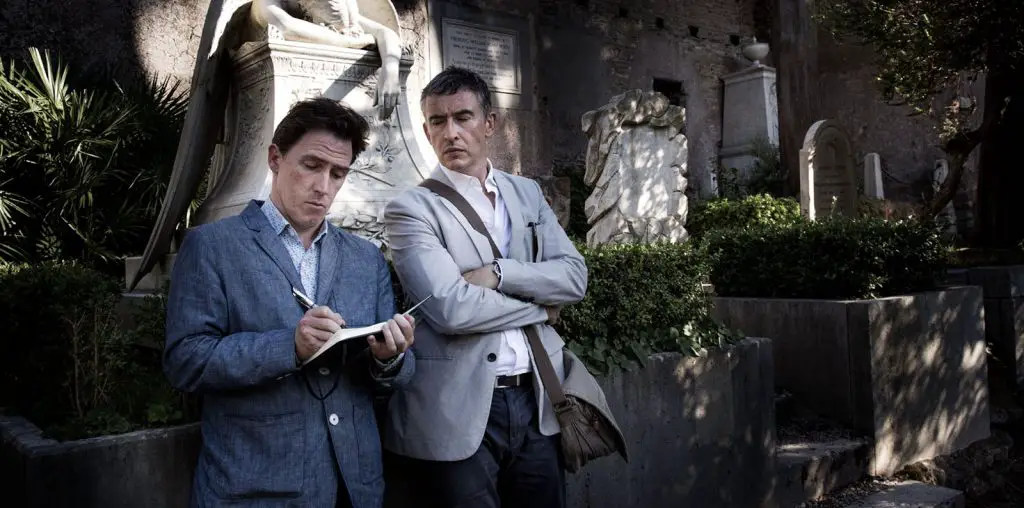
As cast members in the new spy thriller “Duplicity,” Clive Owen and Julia Roberts make perfect sense. The former possesses a confidence and edge that made fodder like “Derailed” and “The International” seem a light day in the gym. He was challenged – and successfully – in the dystopic “Children of Men” and the graphic novelty “Sin City,” even if he couldn’t make the bullshit in “Shoot ‘Em Up” fly for a minute. Roberts, on the other hand, could strike up sass, charm, and some intensity in the “Ocean” capers. Thankfully, she’s come a long way from her smile-reliance learned on the “Pretty Woman” set, and aping seriousness in a slew of thrillers afterwards.
Yet, the pairing recalls a very different bit of recent cinema. In “Closer,” adapted by Patrick Marber from his stage play, Roberts and Owen play a couple temporarily content. Their crisis point comes when Owen’s character returns from a trip, already knowing his wife has grown distant and deceptive and ready to call her on it. When he pulls the truth from out of her, so begins a passive-yet-moreso-aggressive head-to-head. Owen’s character wants her to admit the pleasures of her infidelity, while he’s ready to verbally clobber with every revelation.
Roberts’ character in “Closer” plays his game, as if she’s been to similar territory with outside the narrative proper. In this scene, Owen tears through each line in what I’d bet may be the most vicious scene Roberts ever committed to. (If it had been a routine paycheck job, she would have called for rewrite or balked.) Owen is at ease, since he originated the role on the British stage and had months to make the character his own. Roberts appears to channel the superficiality she employed in many a forgettable role. Now, the character finally gets a beat-down, though she does strike back.
I’m sure Tony Gilroy saw this performance and filed it away. It may even have inspired him to pen “Duplicity,” with an idea that, according to interviews, he’s been carrying around for years. In his new film, and second as writer-director after the powerhouse “Michael Clayton,” Owen and Roberts are two class-A spies who are simultaneously drawn to, and distrustful of, one another. Thus, Gilroy fashions a comic spy thriller that, by the running-time’s finish, we realize is a romance at heart. It’s a quirky genre revision, brisk and self-assured, as is his bitter paranoid thriller/character study “Michael Clayton.”
Yet, the transition between films shows why “Duplicity” is a misstep. This film entertains through gameplay, turning suspenseful, comic, then romantic as if in the hands of a master card dealer. But Gilroy’s trickeries can be revealed by just slightly encroaching the stage. Such an approach toward “Michael Clayton” reveals a lot, that it is foremost the study of a man whose torments and need for redemption run deep, all of it fully organic to the plot line. The title suits the film perfectly, as does “Duplicity,” since Gilroy has abandoned his genre mastery for a shallow diversion.
Not that Michael Clayton overshadows his supporting players. By revealing depths to his character of Arthur Edens, Tom Wilkinson makes impressive use of minimal screen time. Not one scene with him is wasted, as each clarify his emotional death and desire to redeem himself by downing the evil corp UNorth, whom he spent years defending. Tilda Swinton more than deserved her supporting Oscar win by fashioning her character’s motivation from scenes of near silence. With less said, she show how her character ended up a villain allowing corruption to thrive: a revolting yet sympathetic case of career mania.
There’s no such justice to the supporting players in “Duplicity,” though they come off as promising. Paul Giamatti poses as a corporate head whose near-mythical presence is based on shallow perseverance. The man who made “Sideways’” Miles real should bring some depth to this show. Yet, it seems that Gilroy had lost interest in his own ability to make minor characters seem major.
As Howard Tully, a corporate boss with a big secret, Wilkinson reunites with Gilroy. A philosophy-spouting leader with little depth, Tully delivers a speech with as much intensity – though quieter – as his Arthur Edens. His letter is the source that makes Owens and Roberts all giddy – it describes a big score they can steal away from their employers. But Wilkinson’s role is a ruse, a means for Gilroy to pull off his plot trickery. After seeing how he plays out, you’ll wonder if the actor signed on only to pay back Gilroy for “Michael Clayton.”
As a screenwriter, Gilroy has played many games before this, namely adapting misanthropic suspense and thrills in the “Bourne” series and the Pacino-chewing vehicle “The Devil’s Advocate.” (Did the latter script channel Mephistopheles to bring down Pacino forever?) In “Duplicity,” Gilroy returns to earlier days and makes the film fun even if shallow next to his directorial debut. With crisp dialogue at work, Gilroy also deserves credit for his direction. With the help of brother John’s editing and Robert Elswit’s camerawork, Gilroy interweaves various spatial dimensions without dizzying his viewers (of which – I hate to say it – the Scott brothers are often guilty).
Still, a smooth ride boils down to a claptrap, “Usual Suspects”-style finale. It’s barely a sigh next to Michael Clayton’s “You’re so f****d!” which serves such upon his opponent, and hopefully un-fucks himself emotionally.

